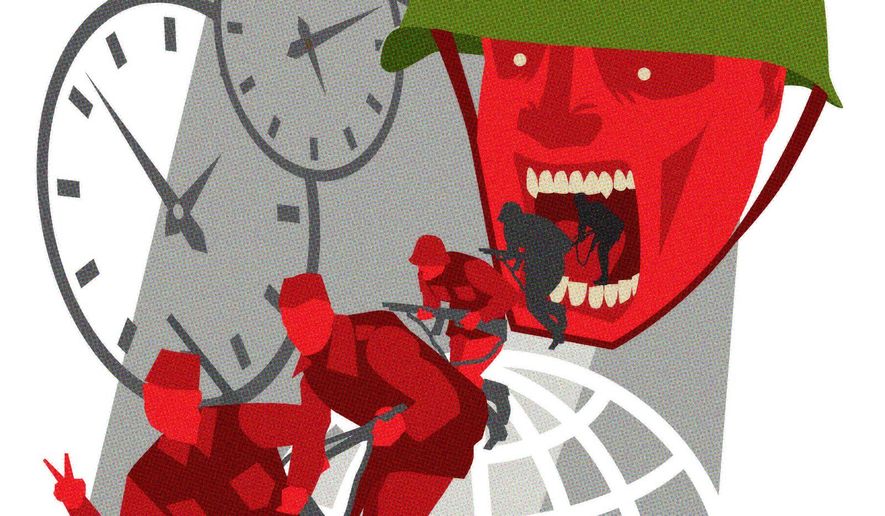OPINION:
Sept. 1 marks the 80th anniversary of Nazi Germany’s invasion of Poland — an event that heralded the beginning of World War II. Two years later, the United States entered the war as an ally of both Great Britain and the Soviet Union. By that time, France and numerous other European nations were effectively under Nazi control.
Thousands of speeches will doubtless be given around the world to commemorate the anniversary. Many of them will inevitably stress how the Soviets fought bravely against Germans, suffering over 20 million casualties in the process. Indeed, that tragedy should never be forgotten. Neither, however, should we allow Moscow to whitewash its culpability in building up, and allying with, the Third Reich’s war machine.
The Kremlin is already working to do just that. Back in May, on the 75th anniversary of “D-Day,” Russian Foreign Ministry spokeswoman Maria Zakharova endeavored to rewrite World War II history, disputing the significance of the Normandy landings that freed Western Europe from Nazi occupation. The historic Allied efforts, Ms. Zakharova claimed, did not impact the course of the war, which had already been “pre-determined” by the sacrifices of the Soviet Red Army.
Such a telling does violence to history. It ignores or minimizes the massive amounts of military and humanitarian supplies that America sent to help the Russian war effort. Moreover, it positions the USSR as a historic moral bulwark against Nazi aggression — rather than as its instigator, at least in the conflict’s early stages.
The point is hardly a semantic one. Embracing the Kremlin’s distorted view of history has the potential to cause costly mistakes in the future as the West engages (or reengages) with Moscow.
Indeed, it’s worth remembering that before becoming bitter enemies, Nazi Germany and Soviet Russia shared much in common. The ideological similarities between Nazis and Communists created a natural intellectual alliance — one codified in the Aug. 23, 1939 Molotov-Ribbentrop Pact, the secret protocols of which laid out which countries each could invade. Eight days later, on Sept. 1, 1939, Nazi Germany invaded Poland from the West and 16 days later the USSR invaded Poland from the East. This was followed by the Soviet Union’s invasion of Finland (November 1939), and Latvia, Estonia, Lithuania and Romania (June 1940).
For 18 months, the USSR and Nazi Germany maintained their illiberal alliance. During this period, Moscow provided large amounts of raw materials that fed the Nazi war machine as it proceeded to invade France, Luxembourg, Belgium, Denmark and Norway, among other countries. Then, without warning, on June 22, 1941 Hitler invaded his Soviet ally, conquering vast amounts of Soviet territory before finally being stopped on the outskirts of Moscow.
The Soviets eventually drove the Nazis from their territory, but did so at enormous human cost. Moreover, that victory was far from assured, and may not have occurred at all without massive American aid provided to the USSR via the Lend Lease program. Between 1941 and 1945, the United States supplied the Soviet Union with more than 11,000 planes, 6,000 tanks, 300,000 trucks and 4,000,000 tons of food supplies, among other materials, at a staggering cost of $11 billion (more than $191 billion in 2018 dollars).
In this manner, Moscow became the West’s ally against Hitler — not because Soviet dictator Josef Stalin felt any affinity for the West, but because the USSR simply had no other recourse if it was to survive. And the moment its survival was secure, Moscow turned on its Western allies, and itself sought to expand further and further into Europe. Only the presence of American troops and massive aid provided through the Marshall Plan prevented the countries of Western Europe from suffering the same fate as their Eastern European cousins, who — once overrun by the Soviet Union — no longer had free speech, free elections, or complete sovereignty.
That history should be instructive today. The Trump administration has correctly continued to cooperate tactically with the Kremlin where possible on issues such as nuclear security, intelligence sharing and jointly operating the international space center. But Moscow’s recent international maneuvers — including its continued aggression against Ukraine and its sponsorship of radical regimes in Syria, Iran and Venezuela, as well as its serial violation of international treaties — clearly run counter to both American interests and global security.
Today, just like at the end of World War II, Russia has a fundamentally different vision of the world order. We should not forget it.
• Herman Pirchner Jr. is president of the American Foreign Policy Council in Washington, D.C.




Please read our comment policy before commenting.